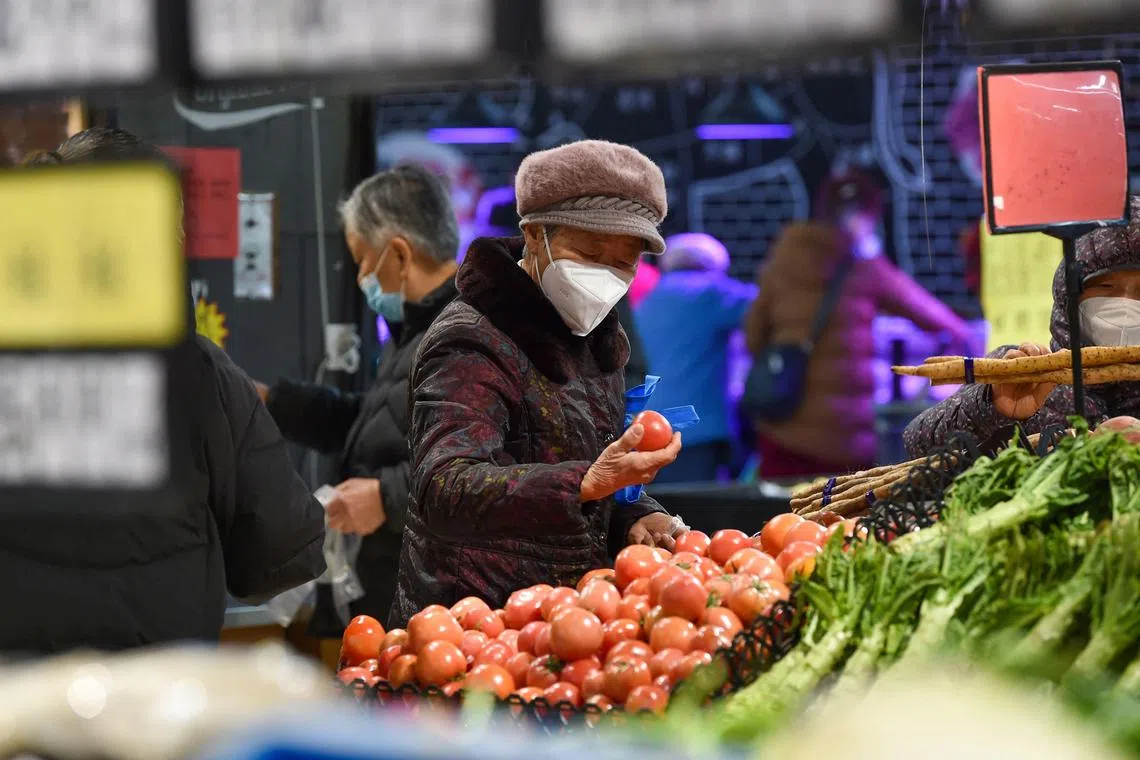China’s weak inflation fuels calls for more policy stimulus
Sign up now: Get ST's newsletters delivered to your inbox

China's core inflation, which does not include more volatile food and energy prices, climbed slightly to 0.7 per cent in March from 0.6 per cent.
PHOTO: AFP
BEIJING – China’s consumer inflation slowed in March despite a pickup in economic activity, while producer prices contracted further, leaving room for the central bank to ease monetary policy as needed to aid the recovery.
The consumer price index (CPI) rose 0.7 per cent in March from a year earlier, the National Bureau of Statistics (NBS) said on Tuesday, down from 1 per cent in February and the slowest pace since September 2021. It also missed economists’ expectations for it to stay flat in a Bloomberg poll.
Producer prices dropped 2.5 per cent in March following a 1.4 per cent decline in the previous month.
Core inflation, which does not include more volatile food and energy prices, climbed slightly to 0.7 per cent from 0.6 per cent.
While the economy has been recovering post-Covid-19, the figures indicate that domestic demand remains weak, giving the authorities space to roll out more supportive policies to make the consumption-led rebound more sustainable. The CPI has remained well below a government-set target of around 3 per cent for the year.
Household sentiment for income and jobs has remained below pre-pandemic levels, while exports are falling and uncertainties are rife in the property market despite some improvement.
Falling car prices also contributed to the slowdown in the CPI, with prices of petrol cars falling 4.5 per cent from a year ago, NBS analyst Dong Lijuan said in a statement accompanying the data.
Mr Zhou Hao, chief economist at Guotai Junan International Holdings, said the authorities need to guide banks to lower mortgage rates significantly to help home buyers and property developers.
The People’s Bank of China (PBOC) unexpectedly lowered the amount of cash banks must keep in reserve in late March, giving lenders more cash to disburse loans.
PBOC governor Yi Gang said earlier in April that maintaining financial and currency stability, including stable prices, are the two key tasks it will keep on focusing on, in a move to facilitate the country’s full employment and economic growth.
The deepening in industrial deflation reflected the impact of a slump in oil prices in March and a high comparison base from a year ago, when energy costs spiked after the war in Ukraine began.
The falling factory prices could add further pressure on industrial companies that have seen profits plunge.
The Chinese government has been vigilant against price changes in key commodities, taking several measures this year to ensure stability. The authorities have bought pork for reserves in a bid to shore up prices, urged futures companies not to exaggerate iron-ore price increases, and are concerned about the rapid surge in sugar costs. BLOOMBERG


